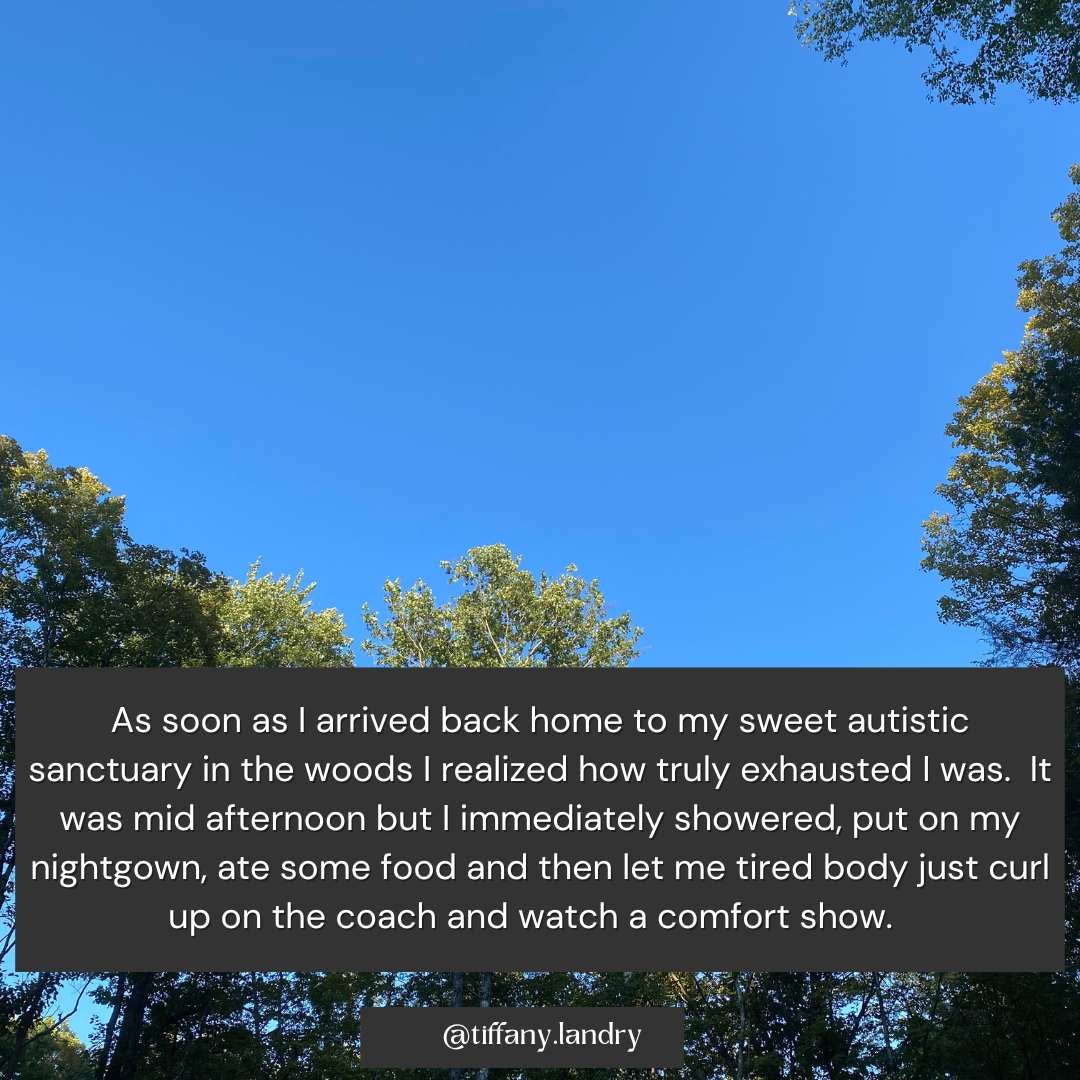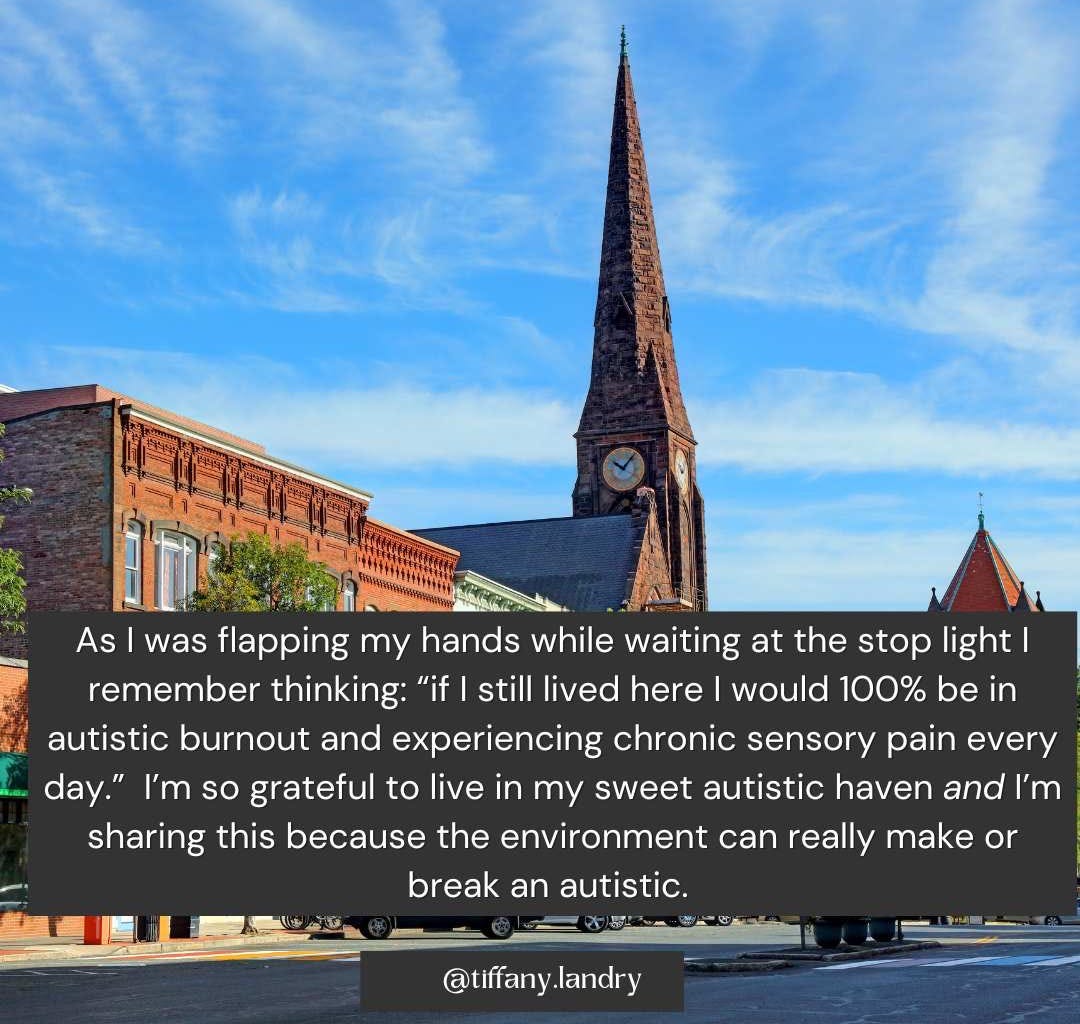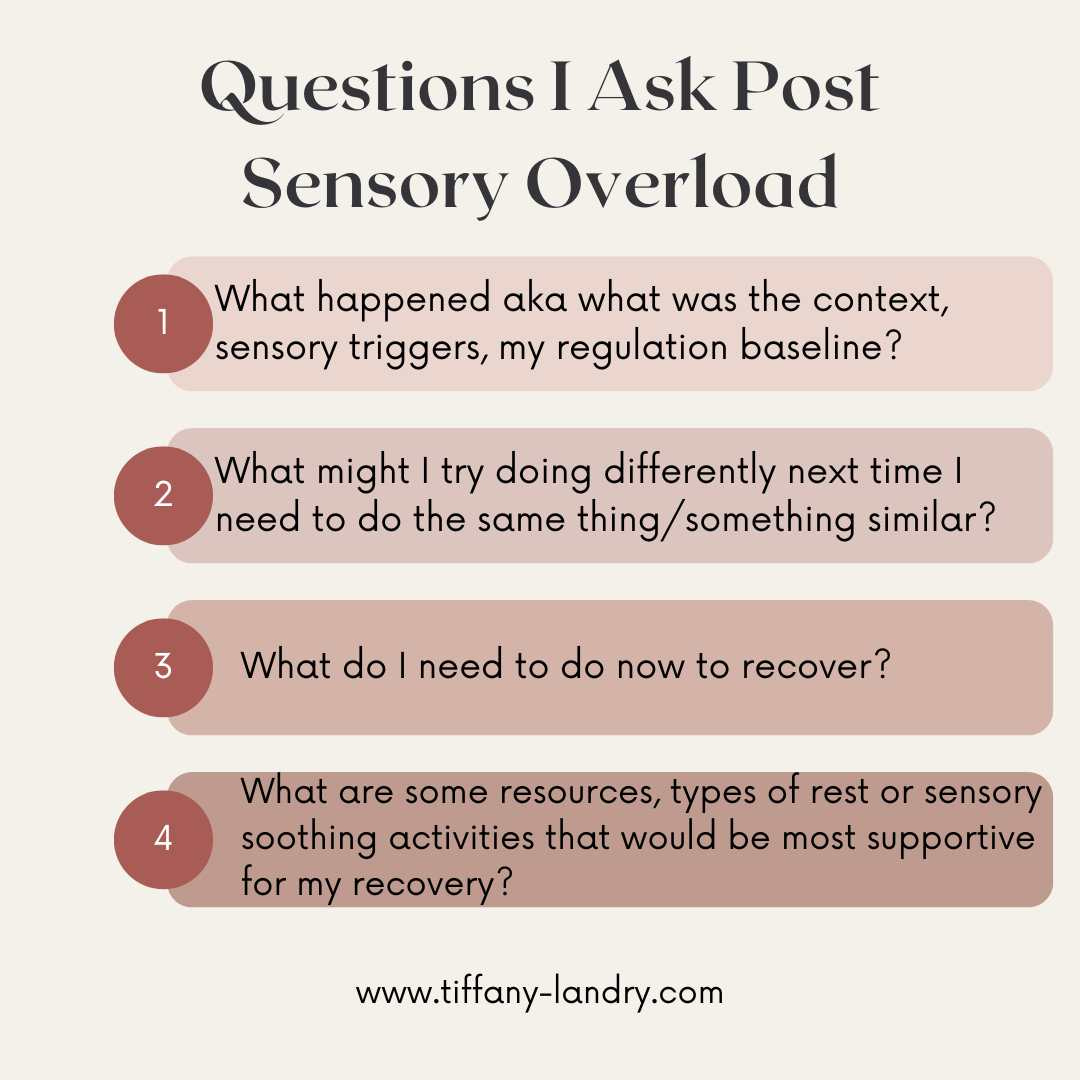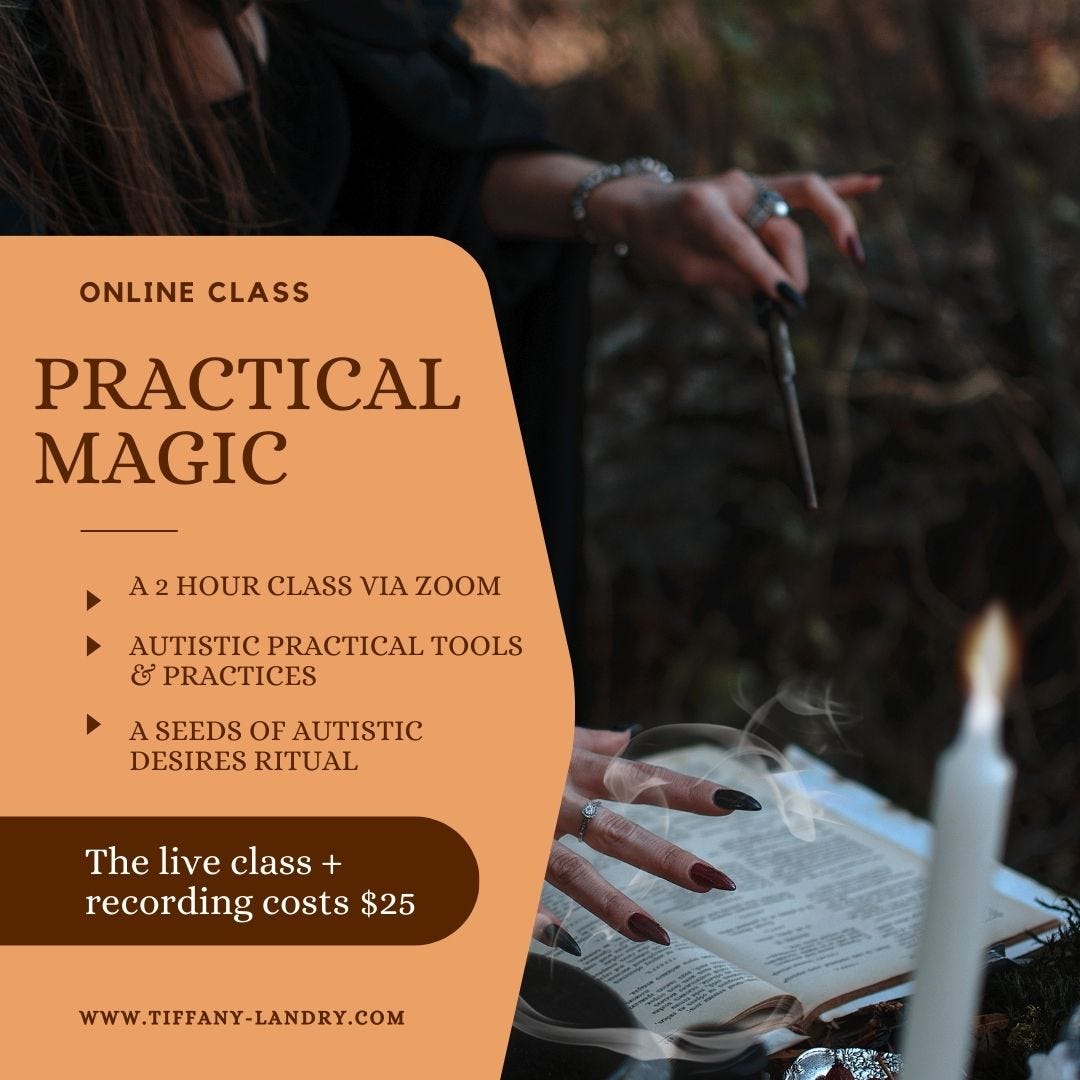Dear reader, I’m excited to share some sensory musings after getting sensory overloaded in the Very Gay But Very Sensory Hellish City where I used to live (and now go to for errands.) I’m also going to share about a new class that I’ll be teaching (for both subscribers and non-subscribers so feel free to tell your friends!) Thanks for being here!
As soon as I step outside of the car in the Very Gay But Very Sensory Hellish City (where I used to live but now visit to do errands) I’m thinking “God, I hate it here.” I switch from my noise cancelling headphones to my AirPods, cue up music and then start walking down Main St. Unfortunately, I happen to be walking in fairly close proximity to a lovely stranger whose perfume immediately feels sensory overloading to me. After taking a quick break so the stranger can walk further away from me I realize that I am not okay. There are too many different people, sounds of cars screeching & breaking and people talking. It’s when I’m at the stoplight flapping my hands and cringing at smells and traffic noise that I realize that if I still lived in this city I would 100% be in autistic burnout and sensory overloaded 24/7.
The truth is that how sensory overloaded I get when I go into the city depends on a variety of factors and that specific day I wasn’t as sensory resourced as I usually am. But I always arrive to my sweet autistic sanctuary in the woods so exhausted from the sensory stress of the city and deeply grateful to be back home surrounded by trees. To me being back in nature after visiting the city feels like the first moment I put on my noise cancelling headphones. That first hit of deep sensory relief, peace and utter bliss. It feels so goddamn delicious to my nervous system and sometimes I audibly let out of a deep moan or sigh of relief. I’m so deeply grateful that I get to live in an environment that’s supportive of my autistic needs and it doesn’t mean that I never get sensory overloaded. But 3+ years since my diagnosis I now have the tools, routines and post recovery protocols to support myself when I experience sensory pain or sensory overload.
I was reflecting this week how when I work with autistic clients my goal isn’t for them to never get sensory overloaded. I wish I could wave a magic wand and poof you, me, my clients and everyone would never experience sensory pain or get sensory overloaded ever again. But unfortunately I lack that particular skill and this word is sensory wise a LOT. Which is why I believe that the goal is to access sensory safe enough conditions and environments whenever possible and to have tools for when you do have to go to sensory less than ideal environments. The reality is that I didn’t enjoy being in a sensory hellish environment this week and I knew exactly how to take care of myself. I had noise cancellation earbuds, I stimmed while walking and at stoplights, I rocked myself back and forth and swayed while waiting for my hair appointment to start and I knew how to support myself when I got into a bit of a freeze response once arriving home.

Can I make this make sense?
It’s been three days since my trip to the Very Gay But Very Sensory Hellish City and I’m honestly still recovering. That looks like needing to move slower, not having as much energy to do things like take long walks or texting. The reality is that I can’t control how long it takes me to bounce back after a sensory stressful event even when I do all the right things. But what I can do is to just keep showing up for myself with so much care and to validate that my response makes sense. Sometimes it’s hard to have something as simple as doing errands have such a huge impact on me. I admit that I sometimes catch myself thinking “ugg, why can’t I do XYZ?” or “I wish I wasn’t so sensory avoidant.1” When that happens I try to extend myself so much compassion and to validate that how I feel makes sense. It’s okay to feel sadness at things that I can’t do or that aren’t accessible to my sensory needs. It makes sense to feel frustrated or tender when it takes longer to recovery from sensory overload. Can I give myself compassion, validation and also permission to feel how I’m feeling?
On a practical note: I’ve found it to be helpful to check in on the specifics of what happened so I can decide if there are some small or big shifts I can make next time I need to do a similar thing or go to the same environment. This is where it’s helpful to get curious about things like:
1.) What actually happened? What was the context, the sensory triggers, how regulated was I before The Sensory Evil Thing happened?
2.) What might I try doing differently next time? This is a great opportunity to explore practical things you might try.
3.) What do I need to do now to recover? You might have already created a sensory emergency plan but if not, focus on 1-3 ways you can recover.
4.) What are some resources, types of rest or sensory soothers that can help you in your recovery? Would it feel supportive to engage in a special interest? Take a rest break? Take a nap?
✨Practical Magic✨
I’m excited to announce the upcoming class that I’ll be teaching! I’m a big believer in the power of practical autistic tools and I’m excited to share some of my favorite autistic tools with you in this two hour class :) In this live two hour class via Zoom (recording also available) we’ll:
✨do some nervous system regulation & grounding together.
✨I’ll teach on my favorite autistic practical tools aka tools you can use to make your life more accessible and supportive. Take what works and leave what doesn't!
✨We’ll do a Seeds of Desire ritual/practice where you’ll identify your biggest and wildest desires on being autistic, creating a supportive life and more!
Tickets are $25 and you can purchase them here.
The wonderful
will be assisting me by helping with the chat and some technical assistance! I’m so grateful to have her assistance and I recommend you check out her newsletter (and meet her in the class!)Questions? You can send me a private message and I’ll respond!
Thanks for reading!
I appreciate you reading this newsletter and being here! I hope you have a lovely Sunday and do something today that feels supportive and nourishing! New here or been here for awhile? Feel free to say hi or to share your favorite stim in the comments!
Sending care,
Tiffany
Current coaching offers:
Slow: a 6 month somatic coaching program with two 90 minute sessions a month, support & coaching Tuesdays via Voxer and a bonus 90 minute call. There is a sliding fee scale for this offer, learn more and apply here.
The Autistic Mentorship: a 5 month coaching program for late identified Autistics/AuDHDers or those who are exploring their neurodivergence. A mixture of autistic life coaching and somatic support. Three 75 minute calls a month + two 30 minute check in calls + neurodivergent workbooks. Learn more and apply here.
Disclaimer: The information contained in this post is for general educational and informational purposes only and should not be construed as medical or mental health advice. The information provided is not a substitute for advice from a qualified professional who is aware of the facts and circumstances of your individual situation.
I’m mostly sensory avoidant but I am sensory seeking in some ways, like I absolutely love deep pressure, enjoy touching soft things and listening to music is sensory soothing for me. It’s really worth it to get to know your sensory profile so you can advocate for your sensory needs and create more sensory safety and joy in your life.






Nothing better than trees!
Looking forward to the Practical Magic workshop!!